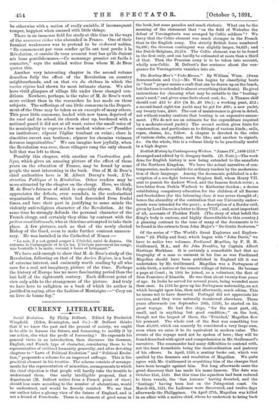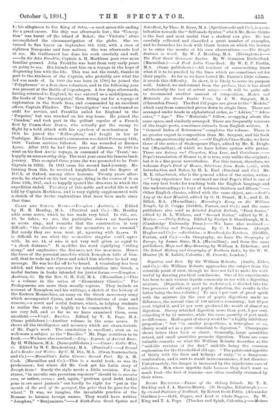Of the series of "The World's Great Explorers and Explora-
tions" (G. Philip and Son), which began with "John Davis," we have to notice two volumes, Ferdinand Magellan, by F. H. H. Guillemard, M.A., and Sir John Franklin, by Captain Albert- Hastings Markham, It is certainly a remarkable fact that no biography of a man so eminent in his line as was Ferdinand Magellan should have been published in England till it was undertaken by Mr. Guillemard. Magellan was a Portuguese of noble birth, a native of the remote village of Sabrosa. He became a page at Court ; in 1504 he joined, as a volunteer, the fleet of Dom Francisco d'Almeida. He was then about twenty-four years of age. In India he served for several years, being wounded more than once. In 1516 he gave up his Portuguese nationality, an act which brought upon him, then and afterwards, much odium. This he seems not to have deserved. Portugal did not appreciate his services, and they were naturally tranferred elsewhere. Three years afterwards (on September 20th, 1519), he started on his great voyage. He had five ships, "for the most part, old, small, and in anything but good condition ; " on the best, though not the largest of these, the 'Trinidad,' Magellan flew* his pennant. The whole cost of the fleet was something less than £5,000, which can scarcely be considered a very large sum, even when we raise it to its equivalent in modern value. The, events of the voyage need not be spoken of here ; they will be found described with spirit and comprehension in Mr. Guillemard's narrative. The commander had many difficulties to contend with, not the least formidable being the insubordination and jealousy of his officers. In April, 1520, a mutiny broke out, which was quelled by the firmness and resolution of Magellan. We quite agree with Mr. Guillemard in acquitting him of the charges that have been brought against him. Not long afterwards came the
discovery that has made his name famous. The date was. October 21st, 1520. But this time the squadron had been reduced to three vessels, the 'San Antonio' having deserted, and the ' Santiago ' having been lost on the Patagonian coast. On March 6th, 1521, the Ladrones were discovered, and twelve days afterwards the Philippines. On April 27th, Magellan was killed in an affair with a native chief, whom he undertook to bring back
t) his allegiance to the King of Sebu,—a most miserable ending for a great career. His ship was afterwards lost ; the 'Concep- tion' was burnt off the island of Behol ; the 'Victoria' alone accomplished the circumnavigation of the globe. She re- turned to San Lucar on September 6th 1522, with a crew of eighteen Europeans and four natives. She was afterwards lost at sea. Mr. Guillemard has done his work carefully and well. —In Sir John Franklin, Captain A. H. Markham goes over more familiar ground. John Franklin was bent from very early years on going to sea. His friends sent him on a voyage in the hope of disgusting him with the life. This was not the result, thanks in part to the kindness of the Captain, who probably saw what the lad was made of. In 1800 (he was born in 1786) he joined the Polyphemus' as a first-class volunteer, and in the following year was present at the Battle of Copenhagen. A few days afterwards, having returned to England, he was entered as a midshipman on the books of the 'Investigator,' then fitting out for a voyage of exploration in the South Seas, and commanded by an excellent officer, Captain Flinders. The 'Investigator' was condemned as unfit for service, and Franklin sailed for England in the Porpoise,' but was wrecked on his way home. He joined the 'Camden,' and took part in the gallant repulse of a French fleet by Commodore Dance, who actually put the enemy to flight by a bold attack with his squadron of merchantmen In 1801 he joined the ' Bellerophon,' and fought in her at Trafalgar. His Lieutenant's commission was dated February 11th, 1808. Various services followed. He was wounded at Buenos Ayres. After 1815 he had three years of idleness. In 1818 he went on his first Arctic voyage, in command of the Trent,' un- happily an unseaworthy ship. The next year came his famous land- journey. This occupied three years (he was promoted to be Post- Captain in 1822). In 1825 came his second land-journey. Re- turning from this, he received knighthood and the degree of D.C.L. at Oxford, among other honours. Twenty years after- wards, he started on his last voyage, dying in the course of it on June 11th, 1817, and so happily spared the disasters in which the expedition ended. The story of this noble and useful life is well told by Captain Markham, and is very rightly supplemented with a sketch of the Arctic explorations that have been male since that time.



































 Previous page
Previous page